Health Resources
How to Use the Student Health Portal
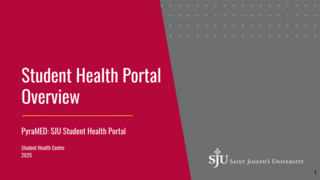


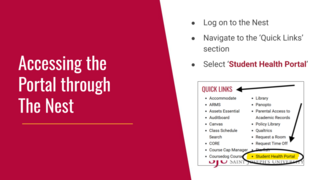

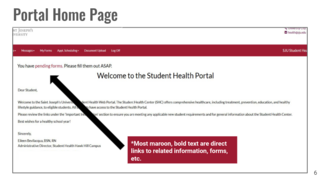
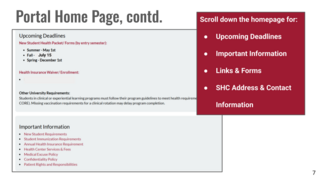
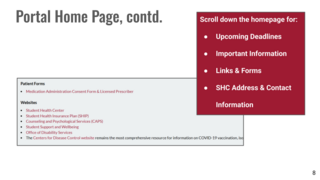

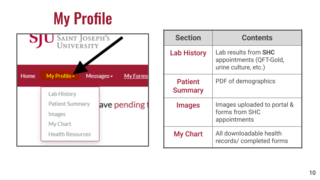
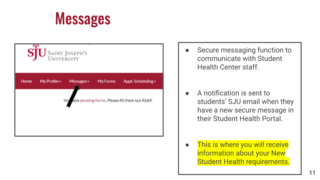
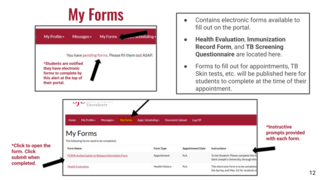

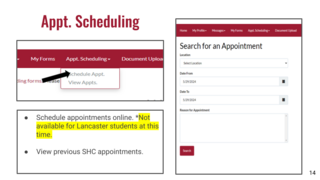


Local Resources
Find information on local hospitals, urgent care facilities, pharmacies, dentists and more below.
American Red Cross Blood Drive
SEVERE SHORTAGE ALERT:
The American Red Cross is facing a severe blood shortage as requests from hospitals exceed the available supply of blood, drawing down the blood supply by about 35% over the past month. Hospitals already strained by the worst flu season in nearly 20 years are now also being forced to triage critical blood products. High flu activity in nearly every state may be sidelining donors, slowing efforts to rebuild the Red Cross national blood supply. We need your help!
Upcoming University Blood Drives:
- Friday, March 20, 2026 from 9 am - 3 pm in the North Lounge of Campion Student Center. To schedule your appointment click here.
Give in March for a $15 Gift Card by email. Successful donations get A1C testing! rcblood.org/March
Health Information
Flu and Covid Vaccines
Getting the updated flu and Covid vaccines remains the best way to prevent severe syptoms, hospitalization, and death. The American Academy of Pediatrics (AAP), the Infectious Diseases Society of America (IDSA), and the American College of Obstetricians and Gynecologists (ACOG)* recommend everyone ages 6 months and older should get an updated flu and Covid shot to protect against severe infection. While getting vaccinated earlier in the season is recommended, vaccination at any time during flu season, typically between October and May, can prevent severe flu-related illness.
Flu and Covid vaccines are available at local pharmacies and the Philadelphia Department of Public Health.
Epilepsy
Epilepsy is a neurological condition characterized by recurring seizures. It is a universal condition which affects individuals of all ages, races, and backgrounds. Epilepsy is not contagious; it cannot be passed from one person to another.
Seizures occur when there is a brief change in how the brain works, lasting from a few seconds to a couple of minutes. Because there are different types of seizures, they don’t all look the same. Some are very noticeable, while others are subtle. The signs of a seizure depend on which type of seizure it is.
Symptoms may include confusion, staring into space, unusual movement, unable to answer questions, wandering. Some may fall down and shake.
To keep someone safe during a seizure, follow these steps.
- Remain calm and call for help. Contact Public Safety 610-660-1111 and 911.
- Stay with the person. Do not leave them alone until the seizure ends and they are fully awake.
- Clear the area. Move any objects nearby that could cause injury such as hard, sharp furniture.
- Check for medical ID. Look for a medical bracelet or ID that may list medications, medical information, and emergency contacts.
- Protect the airway. If they are lying down, gently turn them onto their left side, with their mouth pointing towards the ground. This will help keep their airway clear.
- Time the seizure. Track the duration; if it lasts more than five minutes it is a medical emergency.
- Respect their rights. The student has the right to refuse medical treatment or transport once the ambulance arrives.
- Support the student. After a seizure, the student may be slightly confused, exhausted, or emotional. Once they are alert and able to communicate, explain what happened in simple, direct language. Offer to stay with them until they are ready to go back to normal activities, or offer to call someone to stay with them.
Osborne Shafer, Patty (2022, April 4). Seizure First Aid Training and Certification.
First Aid for Seizures (2024, May 15). CDC
Sexual Health
Learn more about the sexual health services offered at the Student Health Center, including the testing for and treatment of sexually transmitted infections, pregnancy testing and trans care.
Mpox
Per CDC, Mpox (MPV) is a rare disease caused by infection with the Mpox virus. Mpox virus is part of the same family of viruses as smallpox. MPV symptoms are similar to smallpox symptoms, but milder; and MPV is rarely fatal. MPV is not related to chickenpox.
Symptoms of MPV can include:
- Fever
- Headache
- Muscle aches and backache
- Swollen lymph nodes
- Chills
- Exhaustion
- Respiratory Symptoms (e.g. sore throat, nasal congestion, or cough)
- A rash that can look like pimples or blisters that appears on the face, inside the mouth, and on other parts of the body, like the hands, feet, chest, genitals, or anus.
You may experience all or only a few symptoms:
- Sometimes, people get a rash first, followed by other symptoms. Others only experience a rash.
- Most people with MPV will get a rash.
- Some people have developed a rash before (or without) other symptoms.
MPV symptoms usually start within 3 weeks of exposure to the virus. If someone has flu-like symptoms, they will usually develop a rash 1-4 days later.
MPV can be spread from the time symptoms start until the rash has healed, all scabs have fallen off, and a fresh layer of skin has formed. The illness typically lasts 2-4 weeks.
Take the following steps to prevent getting MPV:
1) Avoid close, skin-to-skin contact with people who have a rash that looks like MPV.
- Do not touch the rash or scabs of a person with MPV.
- Do not kiss, hug, cuddle or have sex with someone with MPV.
- Do not share eating utensils or cups with a person with MPV.
2) Do not handle or touch the bedding, towels, or clothing of a person with MPV.
3) Wash your hands often with soap and water or use an alcohol-based hand sanitizer.
If a student or employee starts exhibiting symptoms after being exposed to MPV, is symptomatic and concerned about MPV, or tests positive, they should immediately isolate from others and contact their healthcare provider.
Students who are feeling unwell are urged to visit one of the Student Health Centers for evaluation, referrals and support. In order to gauge the prevalence of MPV on campus, it is important for students to communicate with the health centers. Students can schedule a sick visit with the Student Health Center directly on the website. Residential students who test positive for MPV and live within 200 miles of campus are expected to isolate at their permanent residence.
CDC recommends vaccination for people who have been exposed to MPV and people who are at higher risk of being exposed to MPV, including:
- People who have been identified by public health officials as a contact of someone with MPV.
- People who may have been exposed to MPV, such as:
- People who are aware that one of their sexual partners in the past 2 weeks has been diagnosed with MPV
- People who had multiple sexual partners in the past 2 weeks in an area with known MPV
- People whose jobs may expose them to orthopoxviruses, such as:
- Laboratory workers who perform testing for orthopoxviruses
- Laboratory workers who handle cultures or animals with orthopoxviruses
- Some designated healthcare or public health workers
For the latest information regarding MPV, please refer to the Philadelphia Department of Public Health Website.
Smoke-Free Campus
The PA Free Quitline (1-800-QUIT-NOW) is a telephone-based tobacco cessation counseling service offering free coaching, with no judgment. This program has a proven record of increasing your chances of staying smoke free for good.
- American Lung Association: Quit Smoking
- E-cigs, Menthol and Dip
- 11 Tips for Giving Up Smoking
- How To Quit Smoking
- Quitting Smoking: 10 Ways To Resist Tobacco Cravings
- CDC Quit Smoking
- Quitting vaping? Here are 5 tips for handling nicotine withdrawal
- Quit Vaping
- Coupons for Nicotine Replacement Therapy (patches, lozenges and gum)
Air Quality
Both short and long term exposure to air pollution can lead to a wide range of diseases. Poor air quality can irritate the eyes, nose, and throat, cause shortness of breath, aggravate asthma and other respiratory conditions, and affect the heart. Research has shown that some people are more susceptible than others to air pollutants. These groups include children, pregnant women, older adults, and individuals with a pre-existing heart and lung disease. Know when to expect high levels of air pollution and how to protect yourself here.